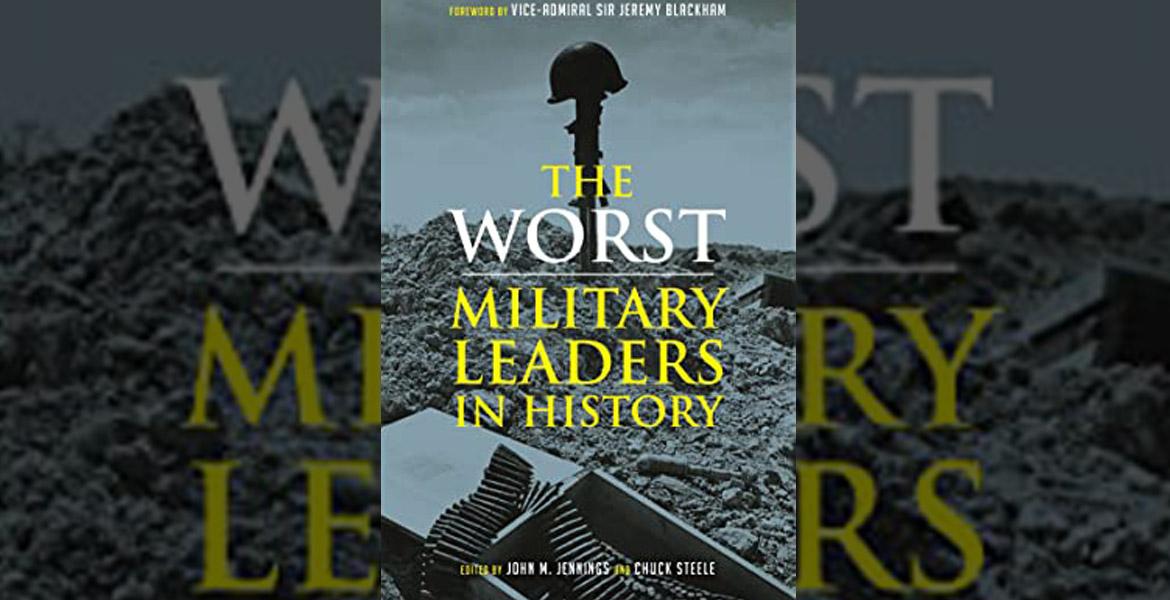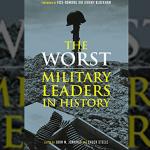The Worst Military Leaders in History, John M. Jennings and Chuck Steele (eds)
The Worst Military Leaders in History takes the reader on a whistle-stop tour of 15 of the world’s most disastrous commanders, from Crassus to Custer, in an original, inverted take on an old topic. Rather than the usual, oft-trod paths of narratives of great leaders, of stunning successes and military genius, the book focuses on the ineptitude, character flaws and mistakes of the other side of the coin: the habitual losers, those raised beyond their level of competence, and those who are blinded by ego or ambition. In a space of about 15 pages each, the contributors defend their choices through biographies and narratives of their subjects’ ignominious defeats, terrible tactics and fatal flaws.
The list of terrible commanders is not exhaustive, and nor does it intend to be. The authors are almost exclusively historians working within the United States military, with the expected mix of gender, race and background, and most of their subjects fit within the range of their experience and knowledge. This is entirely reasonable, but leaves one with a somewhat narrow selection – many choices come from North America, a handful from Europe, and one from Asia. They are also heavily accented towards modern history, with just two from the ancient world, two from the Middle Ages, and none from the early modern period. Aside from the odd few, many leaders – at least outside of West Point – are not well known, confirming the impression given from the introduction that the volume is targeted primarily at students training in the American military. Some statements and considerations can therefore be somewhat surprising to those outside of this select circle. The fact that one author has to justify the inclusion of cult hero Nathan Bedford Forrest – who was both gung-ho and instrumental in the establishment of the Ku Klux Klan (and whom most other nations know only from an oblique reference in Forrest Gump) – in the list, seems a little bizarre at best.
Herein lies one of the potential issues that some readers might have with this volume: it can, perhaps, be biased towards examples from the United States. Out of the whole of history, one might have expected the Indian subcontinent, Africa, or South America to have turned up at least one terrible war leader. Nor would it be wholly out of the realms of possibility to find a poor female warrior, at least from the ancient world (one could, for example, have argued for the inclusion of Boudica). However, as the editors make clear from the very start, balance is not an objective of this book. As the Introduction states, ‘The chapters that comprise this book are neither synopses of their subjects’ lives nor attempts at balanced accounts of what our contributors consider to be history’s worst commanders. This is an exercise in subjectiveInfluenced by personal feelings, tastes, or opinions. history.’ P. 29. Rather, the book has emerged from a number of 'informal discussions’, perhaps during an after-work drink in the pub, and it has the feel of a group of interesting people defending their ideas based on their own experience. If taken in this light, it becomes harder to object to the scope.
P. 29. Rather, the book has emerged from a number of 'informal discussions’, perhaps during an after-work drink in the pub, and it has the feel of a group of interesting people defending their ideas based on their own experience. If taken in this light, it becomes harder to object to the scope.
In a similar vein, the aim of The Worst Military Leaders in History is not to give a thorough analysis of military incompetence and a definitive set of rules for aspiring leaders to follow. Thus, it is lacking on the analytical side, although individual contributors have brought in potential lessons and traced the impact of the deeds of these men to current practices, with one author providing an insightful and scathing attack on modern military culture. However, what this approach does encourage, as the editors emphasize, is readers to think for themselves and to draw their own conclusions.
The other potential problem is that the book falls very much within the 'great' – or in this case the 'not-so-great' – men version of history. Some contributors do add welcome nuance by looking at the cultural backgrounds of their subjects, but there is a tendency toward the idea that the course of history is affected by a few prominent people. This is out of step with much modern historical writing, and certainly with academic culture, and will, I'm sure, lead some to rate this book badly. But, given the title of the book, it would be surprising if this were not the case and the criticism is very much missing the point. The Worst Military Leaders in History is a bugle call to enjoy good story-telling for its own sake. It is the tales of people in the past that give history its interest and that make it relatable to a wide audience; anecdotes, asides, accounts of derring-do and abject failure bring the past to life. There is, then, still a place for this style of writing in the historical disciplines, and it will continue to remain popular with the general public.
Ultimately, this book does what it says on the tin: it offers 15 biographies of men who made monumental mistakes. Sometimes those mistakes had only a minor impact on the wider world; at other times those mistakes changed the course of empires. Some choices might seem bizarre and some are argued better than others. As with all good pub debates, occasionally the arguments contain more passion than sense. However, this book is original, it does provide new information and new ways of perceiving military history, and it does encourage the audience to question their own version of what constitutes a bad – or good – war leader. In this, at the very least, it has fulfilled its objectives. What is more, in making readers feel like flies on the wall at an Oxford Union debate – or at the bar thereafter – it has kept them entertained with lively, interesting and controversial conversation.
- Log in to post comments







